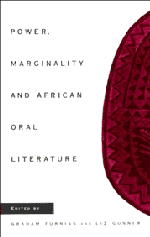Book contents
- Frontmatter
- Contents
- List of contributors
- Preface
- Note on transcription
- 1 Introduction: power, marginality and oral literature
- Part I Orality and the power of the state
- Part II Representing power relations
- 5 Ìgbò énwē ézè: monarchical power versus democratic values in Igbo oral narratives
- 6 Tales and ideology: the revolt of sons in Bambara—Malinké tales
- 7 Images of the powerful in Lyela folktales
- Part III Oral forms and the dynamics of power
- Part IV Endorsing or subverting the paradigms: women and oral forms
- Part V Mediators and communicative strategies
- Bibliography
- Index
5 - Ìgbò énwē ézè: monarchical power versus democratic values in Igbo oral narratives
Published online by Cambridge University Press: 18 December 2009
- Frontmatter
- Contents
- List of contributors
- Preface
- Note on transcription
- 1 Introduction: power, marginality and oral literature
- Part I Orality and the power of the state
- Part II Representing power relations
- 5 Ìgbò énwē ézè: monarchical power versus democratic values in Igbo oral narratives
- 6 Tales and ideology: the revolt of sons in Bambara—Malinké tales
- 7 Images of the powerful in Lyela folktales
- Part III Oral forms and the dynamics of power
- Part IV Endorsing or subverting the paradigms: women and oral forms
- Part V Mediators and communicative strategies
- Bibliography
- Index
Summary
The Igbo people of south-eastern Nigeria are well known to history and the social sciences for the democratic and republican character of their social organisation (see Basden 1921; Leith-Ross 1939; Green 1948; Ejiofor 1981). The saying, Ìgbò énwē ézè ‘the Igbo have no kings’, which appears in the title of this chapter, epitomises this ethos. The saying is perhaps not a denial of the presence of ‘kings’ (ézè) or types of leaders who go by that title in the Igbo social system, now or in the past. Indeed, the linguistic, literary and archaeological evidence before us suggests very strongly that both the institution and the title of ézè have been part of the Igbo experience from remote antiquity and that, despite what appears to have been a far-reaching transformation of the institution and title over the years in favour of a democratic ethos, royalty (in the sense of the majesty of the king as an embodiment of sovereign power) has remained one of the most highly cherished values in Igbo thought in a situation in which monarchy (in the sense of the monopoly of power by one man or one family) is viewed as anathema. It would, therefore, appear that the saying, Ìgbò énwē ézè, is better translated as ‘The Igbo abhor monarchical power’.
- Type
- Chapter
- Information
- Power, Marginality and African Oral Literature , pp. 65 - 82Publisher: Cambridge University PressPrint publication year: 1995
- 11
- Cited by



